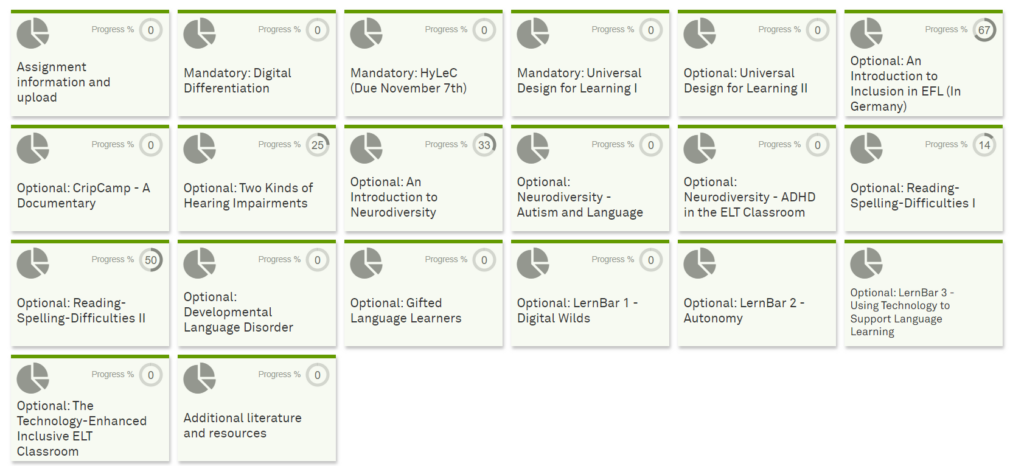Despite increased preparation for pre-service teachers to address issues of difference and dis/ability in the classroom, many future teachers and practitioners report feeling unprepared for meeting the needs of learners in heterogeneous English language learning settings. At the same time, the topics and types of support that would help them feel more competent in this regard must reflect their varied levels of prior knowledge, anticipated teaching contexts, as well as their own learning-related differences. At the TU Dortmund, for example, pre-service English of teachers for all school forms and in various stages of study attend the same seminars. While these future teachers benefit from the socio-constructive interaction with peers who have different backgrounds and professional roles, they are likely to encounter various student needs, depending on their intended teaching assignments.
The BA-course, Inclusive English Language Teaching in a Digital World, thus has the following features in its objective to prepare future English language teachers:
- Didactic biplane (Wahl, 2013)
The didactic biplane, also known as the didactic double-decker or by its more common German name, der pädagogische Doppeldecker, involves modelling methods that future teachers can use in their own classrooms. Students in seminars that utilize this concept experience didactic approaches they can potentially use when they themselves are teachers. An important element of this approach is the inclusion of reflective opportunities.
- Flipped Classroom
With the help of tools that scaffold and structure interaction, students engage in self-directed and self-regulated learning to acquire content and concepts prior to class meetings. Time together in the seminar is spent deepening understanding and making connections through interaction and collaborative tasks. Interactive E-learning tools, such as H5P, TaskCards, Perusall, and Etherpads foster self-regulated learning and cooperative knowledge construction. They also help develop professional digital competences. Regularly scheduled seminar sessions provide opportunities to build on these foundations and examine relevant subject-specific issues.
- Mastery Learning (Decker & Mucha, 2018)
Students are given feedback about their performance, but are required only to receive a “passing” score for their chosen assignments. They may repeat an assignment as frequently as they like to achieve a better outcome. Built-in tools in the Learning Management System Moodle provide scaffolding with immediate feedback, the ability to modify presentation formats or text types, and links to additional resources.
- Student choice regarding content foci
Students have four mandatory modules and complete four additional modules from a choice of 15 additional units. In this way, students can pursue those topics related to inclusive language teaching and learning that they identify as most relevant to them. Some students have extensive prior knowledge of learner differences, whereas others encounter the subject for the first time. Offering students these choices allows them to target their interests and their prior knowledge.

- Student choice regarding assignment types and collaboration/cooperation.
Most modules often students choices regarding the type of material they engage with and submit. A broad definition of tasks is applied, including video-based lectures, teaching artefacts, classroom videos, academic texts, and Internet-based materials.
In addition to automatically graded comprehension checks along behaviorist principles, each module also includes open-ended assignments that require reflection or application of knowledge. Items intended to generate discussion are addressed on interactive bulletin boards, or are uploaded and receive feedback from me. Upload types are usually offered as alternatives, such as audio files, sketches, or narrative texts. In doing so, students have choices with which to demonstrate their understanding, and the principle of student agency is modeled.
- Creation of inclusive teaching material
For the final product, students prepare material for their own future classroom use, with the support of HyLeC, the TU’s makerspace. Here, the students have an opportunity to apply their declarative knowledge about what helps all learners in a heterogeneous classroom into creating tangible objects reflecting that understanding. In doing so, they also gain an appreciation for corporeal issues related to embodiment and physical spaces in the classroom. In a task cycle-based approach, students experience designing and realizing an output for English language teaching and learning. This work culminates in a gallery walk on the last day of the seminar and a written reflection.
The seminar was inspired by previous work on Curriculum 4.0 and ELLeN: English Language Learning & Neurodiversity.